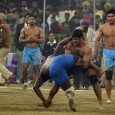By Agha Akbar –
Poisted on the crest of a wave
Team Pakistan’s recent upscale performances, with barely a few hiccups, constitute its most consistent stint in international cricket for some while. The wins though are a mixed bag, coming most commendably against England, the top ranked side in Tests, as well as Sri Lanka, but in the main against lesser outfits. With Pakistan cricket, some questions always remain, even in victory.
Will all the positives turn out to be a mere case of ‘flattering to deceive’, as has happened with regularity in the past, even with the talent-packed sides of the 1970s and the 1990s, and some exceptionally gifted ones in the 2000s?
This new phenomenon – the Pakistan team for a very large part living up to its potential, even punching above its weight, braving the odds and not caving in, snatching victory from the jaws of defeat instead of tamely surrendering – going to last? Or is this hint of promise, reform and resolve too going to wither away, like it has many a time before to the dismay of its diehard (literally speaking) followers?
The question is valid, on a number of counts. Team Pakistan aside, Pakistan Cricket Board has not exactly been an epitome of efficiency and consistency in the past. And never has it really been a meritocracy.
And by now it is an established fact that a team is only as good as those managing it. That only a competent, dynamic, driven lot in the corporate boardroom can produce, equip and imbue the spirit to conquer – without ever letting up, regardless of the opposition or conditions.
The Aussies are the perfect example. Forever competitive and ferociously so in the last 25 years, Australia has been by far the most outstanding outfit in world cricket. This includes the period when the West Indies was at its acme with Pakistan threatening to be the next global hegemon of the game. Yet Australia managed to hold sway, first in patches, but later by firmly parking itself at the summit from the late-1990s onwards, until the most recent dip.
Team Australia’s rise and rise has owed in great measure to the ascendancy of excellence in Cricket Australia.
Compare it with India. Despite its billion-plus population (the hugest reservoir of talent on this planet), passion for the game like nowhere else (maybe religion surpasses it, maybe but if it does, the margin would be wafer thin; and Bollywood – once the biggest draw – now feeds off it), Team India’s performance has over the years remained quite patchy. Even now when it is the sole superpower of the game, much like the United States in a different vein, due to Corporate India’s insatiable thirst for riding piggyback on cricket’s popularity spawned by the advent of television channels, it may have become world champion again on home soil, it does not sport the demeanour of one.
Despite its clout, Cricket India is mired in inefficiency and rampant cronyism. And it reflects in Team India’s showing, its being whitewashed twice in back-to-back four-Test rubbers in England and Australia only recently puts it in very sharp relief.
The only really bright spot in Indian cricket is the Indian Premier League. And from the borrowed concept to its brilliant execution in its formative years, it was Lalit Modi’s baby. Some in India and elsewhere may question his methods, even his morals and integrity, but his efficiency is undeniable.
Before I ramble further, let me get back to Team Pakistan and the question: Is this resurgence for real or yet another mirage? Already between its latest Asia Cup victory and the incredible total domination over England in the Test rubber, some loss of steam and heart was quite palpable when England was allowed to rebound and win six out of the seven overs-limited games (four one-dayers and two Twenty20 matches).
And without taking any credit away from the win in the Asia Cup, Pakistan lost the marquee match against India despite putting up a massive 329 on the board, and the ease with which the arch-rivals achieved it hurt, somewhat diminishing the final outcome. (This though needs to be considered that while only a continental event, three out of the four finalists of the World Cup 2011 were taking part with each keen to prevail. And Bangladesh perhaps too tired of being the perpetual whipping boys, played out of their skins and really rocked).
In that backdrop, some question marks were raised against the captain by the commentariat, especially concerning Misbah’s field-placing which were not attacking enough with such a huge total to defend. The win in the first match against Bangladesh was also too close to call, although the hosts heroically went on to beat India and then trounce Sri Lanka to clinch a place in the final, which they took to the wire, only faltering on the final delivery.
This is not to denigrate the national team on its successes, as it has had to pull itself out of a deep black hole in which the greed and mendacity of some former players had landed them. The team spirit was in total disarray, the psychological pressures had mounted, and suspicion grew like a weed to disrupt harmony and unity within it.
Above all, there was, and unfortunately still is, going through the terrible embarrassment of playing ‘home’ series in foreign countries, as no one is willing to tour here due to the precarious security situation and the Sri Lankan team debacle and near-tragedy in Lahore. This denial of home advantage can be extremely unsettling, for everyone, the boys and the management alike. But for the young and impressionable, living out of suitcase for the better part of the year definitely is an additional burden.
Seen in that light, this new-found consistency is something commendable, and must be cherished. There is promise of more of the same, if some factors remain constant. First of these is skipper Misbah-ul-Haq, with talk of dislodging him already being lobbied.
Let us put this in context.
Pakistan cricket in its successful phases has always revolved against legendary, larger than life skippers: Abdul Hafeez Kardar was the first example and Imran Khan the last, with precious little in between and since in terms of respect, knowledge, inspiration and charisma. To put a fine distinction, while these two were skippers, the rest were nothing more than mere captains.
The present incumbent, though cannot be compared with the other two, but has started off on a promising note. He is not just calm and relaxed, his attributes rub off on the side; his tactics are mostly sound, and his often rearguard batting has saved the day more than once for his side, far outnumbering the tuk, tuk variety that failed to deliver in a crunch. And to be fair to Misbah, he has a largely raw outfit at his command.
Will he retain this pivotal position, is the question? What the Board’s succession plans are and its timing?
The other key point: will the cricket board, the present dispensation that is, retain the maturity, restraint and focus that it has displayed in the six months under Zaka Ashraf’s watch? The chairman’s position, in contrast to other leading cricketing nations, is of far greater consequence: his say is not just final, every call is his!
That’s why in these turbulent times, which way these two questions are answered shall decide Pakistan cricket’s fate at least in the short term.
A political appointee much like his predecessor, and apparently much too keen to bask in reflected glory (and for a newbie, he seems quite adept at milking it to the maximum) are negatives. But his management style in his six months in office seems to have a far greater measure of pragmatism than the bull-in-a-china-shop Ijaz Butt kind. So far on the diplomatic front as well as in key decisions, he has mostly taken his time and, importantly, has been spot on. All of what he inherited in key positions in team management and the selection committee stands replaced – well. The interim coach Mohsin Khan, and the stand-in chief selector Mohammad Ilyas have been sent packing. The new chief selector is much respected Iqbal Qasim and the new coach the man with the proven credentials, Dav Whatmore. A massive improvement by any means!
On the diplomatic front, an endeavour in real earnest at fence-mending with the ICC and other nations is on to end Pakistan’s no-go destination status and plans to launch an indigenous Premier League are already in the planning stage.
So far the captain and the chairman both look good. But things could go awry, and in a jiffy – such has been Pakistan cricket. And this is not likely to be immune to shocks and bouts of disarray unless the management structure is transformed, to make it more akin to Australia, South Africa and England’s – far distant from the prevalent model amongst the Asians, the Caribbeans and Zimbabwe.
The writer is Sports and Magazines Editor, Pakistan Today































































































